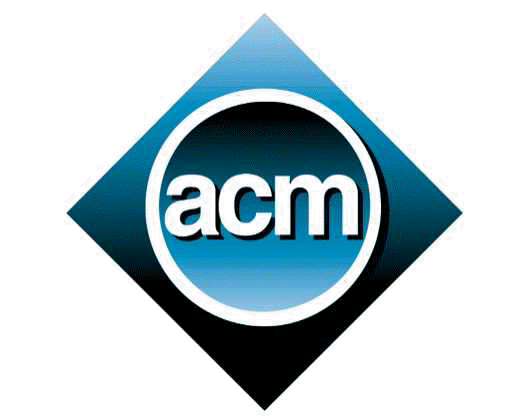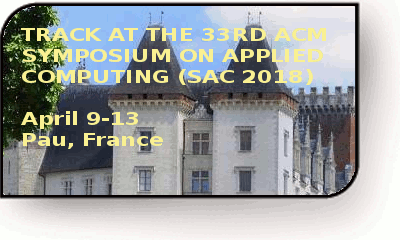|
SAC 2018
For the past thirty two years, the ACM Symposium on Applied Computing
(SAC)
has been a primary gathering forum for applied computer scientists, computer engineers, software engineers, and application developers from around the world.
SAC 2018
is sponsored by the ACM Special Interest Group on Applied Computing (SIGAPP)
and is hosted by hosted by Université de
Pau et des Pays de l'Adour (UPPA), Pau, France.
Call For Student Research Abstracts:
Graduate students seeking feedback from the scientific community
on their research ideas are invited to submit original abstracts of
their research work in areas of experimental computing and
application development related to SAC 2018 Tracks. The Student
Research Competition (SRC) Program is designed to provide
graduate students the opportunity to meet and exchange ideas
with researchers and practitioners in their areas of interest.
For further details see the call for student research abstract and the
ACM Student Research Competition Web page.
OOPPS TRACK: AIMS AND
TOPICS
Object-oriented programming has become the mainstream programming paradigm
for developing complex software systems in most application domains.
However, existing OO languages and platforms need to evolve to meet
the continuous demand for new abstractions, features, and tools able
to reduce the time, effort, and cost of creating object-oriented
software systems, and improving their performance, quality and usability.
Nowadays parallel architectures are everywhere. However parallel programming is still reserved to experienced programmers. The trend is towards the increase of cores in processors and the number of processors in multiprocessor machines: The need for scalable computing is everywhere. But parallel and distributed programming is still dominated by low-level techniques such as send/receive message passing and POSIX threads. Thus high-level approaches should play a key role in the shift to scalable computing in every computer.
Algorithmic skeletons (Google's MapReduce being the most well-known skeletal parallelism approach), parallel extensions of functional languages such as Haskell and ML, parallel logic and constraint programming, parallel execution of declarative programs such as SQL queries, genericity and meta-programming in object-oriented languages, etc. have produced methods and tools that improve the price/performance ratio of parallel software, and broaden the range of target applications. Also, high level languages offer a high degree of abstraction which ease the development of complex systems. Moreover, being based on formal semantics, it is possible to certify the correctness of critical parts of the applications. The aim of all these languages and tools is to improve and ease the development of applications (safety, expressivity, efficiency, etc.).
OOPPS is seeking for research advances bringing benefits in all
those typical aspects of software development, such as modeling, prototyping, design, implementation,
concurrency and distribution, code generation, analysis, verification, testing, debugging, evaluation,
deployment, maintenance, reuse, and software evolution and adaptation.
The specific topics of interest for the OOPPS track include, but are not limited to, the following:
- Algorithms and high-level models (CGM, BSP, LogP, MapReduce, etc.)
- Artificial intelligence, software engineering and formal methods applied to high-level parallel programming
- Applications of high-level approaches, benchmarks and experiments
- Aspects and components
- Code generation, and optimization, just-in-time compilation
- Context-oriented programming
- Databases and persistence
- Design, implementation and optimisation of high-level programming languages
- Distribution and concurrency
- Dynamic and scripting languages
- Evaluation
- Feature Oriented Software Development and Programming
- Formal verification
- Internet of Things technology and programming
- Integration with other paradigms
- Interoperability, versioning and software evolution and adaptation
- Middleware and tools: performance predictors, visualisations of abstract behaviour, automatic hot-spot detectors, high-level resource managers, compilers, automatic generators, etc.
- Language design and implementation
- Modular and generic programming
- Reflection, meta-programming
- Runtime verification and monitoring
- Secure and dependable software
- Static analysis
- Testing and debugging
- Type systems and type inference
- Virtual machines
TRACK CHAIRS
- Davide Ancona
- DIBRIS, University of Genova, Italy
- (davide AT disi.unige.it)
- Frédéric Loulergue
- Northern Arizona University, USA
- (frederic.loulergue AT nau.edu)
|
|
IMPORTANT DATES
- Abstract submission (regular and SRC papers)
September 15, 2017 September 25, 2017 (full paper upload before October 1st) - Paper and SRC notifications
November 10, 2017November 17, 2017- Paper and SRC camera-ready copies
November 25, 2017December 2, 2017- Author registration
December 10, 2017- SAC 2018
- April 9 - 13, 2018
PROGRAM COMMITTEE
- Marco Aldinucci, University of Torino, Italy
- Mohamad Al Hajj Hassan, Huawei, Germany
- Lorenzo Bettini, University of Firenze, Italy
- Carl Friedrich Bolz, Germany
- Mathias Bourgoin, LIFO, Université d'Orléans, France
- Viviana Bono, University of Torino, Italy
- Marcello Bonsangue, Leiden University, The Netherlands
- João Costa Seco, Universidade Nova de Lisboa, Portugal
- Inês de Castro Dutra, Universidade do Porto, Portugal
- Kento Emoto, Kyushu Institute of Technology, Japan
- Sebastian Erdweg, TU Delft, The Netherlands
- Erik Ernst, Google Inc., USA
- Alexandros Gerbessiotis, NJIT, USA
- Paola Giannini, University of Piemonte Orientale, Italy
- Khaled Hamidouche, AMD Research, USA
- Geoff Hamilton, Dublin City University, Ireland
- Robert Hirschfeld, Hasso-Plattner-Institut, University of Potsdam, Germany
- Hideya Iwasaki, The University of Electro-Communications, Japan
- Jaakko Järvi, University of Bergen, Norway
- Clinton Jeffery, University of Idaho, USA
- Herbert Kuchen, Westfälische Wilhems-Universität
Münster, Germany
- Arnaud Lallouet, Huawei Technologies, France
- Doug Lea, Suny Oswego, USA
- Hidehiko Masuhara, Tokyo Institute of Technology, Japan
- Rosemary Monahan, Maynooth University, Ireland
- Virginia Niculescu, Babes Bolya University, Romania
- Tobias Pape, Hasso-Plattner-Institut, University of Potsdam, Germany
- Nick Papoulias, IRD, UPMC, Sorbonne University, France
- Pavel Parizek, Charles University, Czech Republic
- Susanna Pelagatti, University of Pisa, Italy
- Md. Wasi-ur Rahman, Intel, USA
- António Ravara, Universidade Nova de Lisboa, Portugal
- Jean Charles Régin, Université de Nice Sophia Antipolis, France
- Guido Salvaneschi, TU Darmstadt, Germany
- Christian Schute, KTH Royal Institute of Technology, Sweden
- Julien Tesson, Université Paris-Est Créteil, France
- Vincent von Hof, University of Münster, Germany
PROCEEDINGS
Accepted papers will be published by ACM in the annual conference proceedings.
Accepted posters will be published as extended abstracts in the same proceedings.
Paper registration is required, allowing the inclusion of the papers and posters in the conference proceedings. An author or a proxy attending
SAC MUST present the paper. This is a requirement for all accepted papers, posters, and invited SRC submissions to be
included in the ACM digital library. No-show of scheduled papers, posters, and student research abstracts will result in
excluding them from the ACM digital library.
Student registration is only intended to encourage student attendance and does not cover inclusion of papers/posters in the conference proceedings.
ACCEPTED PAPERS
- Textual Alignment in SPMD Programs.
Frederic Dabrowski.
- Enabling lock-free concurrent workers over temporal graphs composed of multiple time-series.
Francois Fouquet, Thomas Hartmann, Sébastien Mosser and Maxime Cordy.
- OOlong: An Extensible Concurrent Object Calculus.
Elias Castegren and Tobias Wrigstad.
- A type and effect system for uniqueness and immutability.
Paola Giannini, Marco Servetto and Elena Zucca.
- Implementing Modular Class-based Reuse Mechanisms on Top of a Single Inheritance VM.
Pablo Tesone, Guillermo Polito, Luc Fabresse, Noury Bouraqadi and Stéphane Ducasse.
- CBM: A Compact Representation and its Parallel Search for Query Processing on GPU Framework on GPU (poster paper).
Chantana Chantrapornchai, Chidchanok Choksuchat and Sergei Gorlatch.
- Automatic Scalable Parallel Test Case Execution. Introducing the Münster DiStributed Test Case Runner for Java (MiDSTR) (poster paper).
Vincent Christoph von Hof and Andreas Fuchs.
- Node-level Optimization by Caching Data and Choosing the Optimal Tile Size for Parallel Dense Linear Algebra on Distributed Systems (SRC paper).
Yonghyun Ryu.
|

